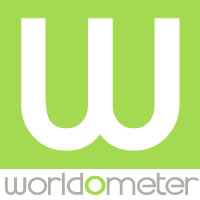Coronavirus
- Thread starter C.B. Brown
- Start date
You are using an out of date browser. It may not display this or other websites correctly.
You should upgrade or use an alternative browser.
You should upgrade or use an alternative browser.
New studies from Israel are showing that the double dose of Pfizer vaccine is only 65% effective at stopping the Delta variant but 95% effective against hospitalization and death. Don`t throw away your masks yet.
The vaccination progress in Quebec as of today, last numbers. Less than 12 years old, still not eligibled to vaccination.
Hope they could be within a few months.

Hope they could be within a few months.
Indonesia has seen a rapid increase in the number of new COVID infections.
Indonesia's Health Ministry on Tuesday reported 31,189 new COVID infections and 728 deaths on Tuesday, both record daily increases.
The delta variant has rapidly pushed up case numbers in Indonesia, leaving hospitals in a critical state and facing a shortage of oxygen to treat COVID patients.
That’s why Jakarta has imposed a strict lockdown on its major islands of Java and Bali.
Pour combattre le Delta variant et autres variants à se développer à travers le monde et comme ils sont très contagieux Pfizer nous annonce qu'il travaille sur un autre vaccin pour les combattre....if it's what we will need....pour moi et en fonction de mon âge je
n'hésiterais pas à y recourir....aucune risque à prendre.
n'hésiterais pas à y recourir....aucune risque à prendre.
Pour combattre le Delta variant et autres variants à se développer à travers le monde et comme ils sont très contagieux Pfizer nous annonce qu'il travaille sur un autre vaccin pour les combattre....if it's what we will need....pour moi et en fonction de mon âge je
n'hésiterais pas à y recourir....aucune risque à prendre.
The big question is if Pfizer manufacturing should be focused towards a third shot for us or a first/second shot for the rest of the world. My vote is the rest of the world and 100% for selfish purposes.
QUÉBEC.....aujourd'hui la distanciation passe de 2 mètres à 1 mètre....bonne nouvelle enfin...anyway de mois en moins de personnes respectaient le 2 mètres.....la vie reprend tranquillement sa normalité 

 .
.

After Fivefold Jump In Covid Cases, Netherlands Is Ruing Nightlife Reopening
The country has reversed course on its reopening after cases surged to their highest levels of the year.
 www.forbes.com
www.forbes.com
Just weeks after lifting nearly all its pandemic restrictions, the Netherlands is battling one of the biggest increases in coronavirus cases in the world, forcing it to reverse course and demonstrating the challenge of reopening amid an ever-changing pandemic.
Nearly 52,000 people in the Netherlands tested positive for Covid-19 over the past week, a more than 500% increase from the week prior, according to Dutch government data released Tuesday.
With the more infectious delta variant becoming increasingly prevalent, new infections have soared more than 1,130% in the last 14 days, according to a tracker run by The New York Times, the fourth-largest increase in the world over that period behind just Malta, the British Virgin Islands and Laos.
Look at this site

 www.worldometers.info
www.worldometers.info
Sort by weekly change (5th column).
We should and can learn from others.

COVID-19 Weekly Trends by Country - Worldometer
New cases and deaths in the last 7 days vs. the preceding week. Absolute and percentage change, weekly cases and deaths per million people in every country in the world
Sort by weekly change (5th column).
We should and can learn from others.
QUÉBEC joue à la LOTTO avec la COVID-19.....s'inspirant de ce qui se fait ailleurs QUÉBEC emboîte le pas.
Du 1er Août jusqu'au 27 Août 150,000 sera attribué chaque semaine aux adultes ayant recu 1 dose et s'étant inscrits sur le portail.
Le 3 Septembre 1 million pour les 2 doses..
Les 12-17 ans ne sont pas en reste..16 jeunes pourront recevoir jusqu'à 20,000 en bourse d'études le 3 Septembre.
Évidemment l'on peut se questionner sur l'efficacité d'une telle stratégie...... MAIS POURQUOI PAS ....rien à perdre.....tout à gagner....de l'argent et surtout l'immunité....lol......et quand on connaît l'appétit insatiable des Québécois pour les loteries c'est une win win
....rien à perdre.....tout à gagner....de l'argent et surtout l'immunité....lol......et quand on connaît l'appétit insatiable des Québécois pour les loteries c'est une win win
situation. ...et moi qui ne participe presque jamais à ces tirages.....et bien oui je vais tenter ma chance....
...et moi qui ne participe presque jamais à ces tirages.....et bien oui je vais tenter ma chance.... ....
....
Du 1er Août jusqu'au 27 Août 150,000 sera attribué chaque semaine aux adultes ayant recu 1 dose et s'étant inscrits sur le portail.
Le 3 Septembre 1 million pour les 2 doses..
Les 12-17 ans ne sont pas en reste..16 jeunes pourront recevoir jusqu'à 20,000 en bourse d'études le 3 Septembre.
Évidemment l'on peut se questionner sur l'efficacité d'une telle stratégie...... MAIS POURQUOI PAS
situation.

Covid-19 cases are surging in 46 states. In one hot spot, hospitalized patients are younger than ever, doctor says | CNN
Just as health experts predicted, the combination of unvaccinated people and the more contagious Delta strain of coronavirus has led to new Covid-19 surges.
Covid-19 cases are surging in 46 states. In one hot spot, hospitalized patients are younger than ever, doctor says.
Just as health experts predicted, the combination of unvaccinated people and the more contagious Delta strain of coronavirus has led to new Covid-19 surges.
In 46 states, the rates of new cases this past week are at least 10% higher than the rates of new cases the previous week, according to data from Johns Hopkins University.
In 31 states, new cases this past week are at least 50% higher than new cases the previous week.
CDC is calling the Delta variant the "pandemic of the unvaccinated". Imagine just how bad this would be if there wasn't a vaccine. NY is seeing a slight uptick in the positivity rate, but not like many of the other states.

 thehill.com
thehill.com

CDC director warns of ‘pandemic of the unvaccinated’ as cases rise
Centers for Disease Control and Prevention (CDC) Director Rochelle Walensky warned of rising cases on Friday, stating that COVID-19 is “becoming a pandemic of the unvaccinated” and that…
A new study states the Covid19 can effect a guys erection in other words cause erectile dysfunction in some men. I kid you not this is serious stuff . Maybe this is why stubborn anti vaxx individuals like CLOUD 500 are suddenly lining up for a Pfizer jab.
OLYMPIC GAMES....IMHO ces Jeux n'auraient jamais dues avoir lieu cette année....aucun public, des cas de COVID qui se manifestent déjà à l'intérieur et des athlètes atteints en plus de ceux qui ont fait défection.....c'est juste le début et c'était prévisible à
voir comment la situation se dégrade à travers le monde.....don't get me wrong....am a big fan and i know how important it is pour les athlètes qui s'y préparent intensément depuis des mois--années MAIS le bon sens, la logique et leur sécurité auraient du
prévaloir....je crains hélas un horrible gâchis.....my 2 cents.
voir comment la situation se dégrade à travers le monde.....don't get me wrong....am a big fan and i know how important it is pour les athlètes qui s'y préparent intensément depuis des mois--années MAIS le bon sens, la logique et leur sécurité auraient du
prévaloir....je crains hélas un horrible gâchis.....my 2 cents.
You have a great point. Japan's COVID cases are on the rise, they have a low vaccinated population, sadly it sounds like a recipe for disaster. The NHL was able to have their playoffs in a "bubble" without any real issues. I wonder if it's possible to create a "bubble" to contain the Olympics or is that just too big to pull off. They postponed the Olympics for a year already, but big dollar sponsor's and TV rights may have a bigger say than common sense. It's all about the Benjamin's.

India’s excess deaths during Covid ‘could be 10 times official toll’
Study gives most comprehensive picture yet of true toll of pandemic in India
The number of excess deaths in India during the Covid-19 pandemic could be 10 times higher than the official death toll, according to a study that estimates that between 3 million and 4.7 million more people died than would be expected between January 2020 and June 2021.
The study, carried out by the US-based Center for Global Development, examined three different sources of data to piece together one of the most comprehensive pictures yet of the pandemic in India.
Good news...WH will have '' regular contact'' with FOX on COVID and vaccination.....they need to reach FOX audience....it's not a political issue....it's a major health issue qui concerne tous les citoyens.....that's the way to go. 
That's certainly a good idea. Getting the word out to as many people as possible will save lives. The White House should have been doing this all along. Much like their regular contact with the other news agencies. All of this reminds of that one guy at work who blames everyone else for his mistakes or shortcomings instead of himself. The president is that guy. He needs to focus on the big problem here and find a solution to it. Instead the president chooses to headline many things that may be important, but they are not as important as encouraging people to get vaccinated. Using federal resources to help local governments combat this deadly virus would make a huge difference in many communities. Sending the VP to a section of the Mexican border with nobody illegally crossing just to get a photo op can be done later. Senator Rand Paul having a shouting match with Dr. Fauci, a man who's committed the last 4 decades of his life to helping saves lives is ridiculous and can be done later. US COVID cases are up 200% in the past two weeks and nobody at the top is stepping up to do something about it. If it's about the Delta variant running rampant amongst the unvaccinated then that's were the problem is. The states are closing down their large COVID vaccination sites which are mostly in the less rural parts of their states. The Fed needs to use more federal resources to get vaccination sites to communities with high infection rates, or better yet try to get there and promote vaccinations before infection rates start going up. The White House talking to Fox News is not the solution. The White House needs to get their shit together and focus on saving lives.
There are disturbing signs that the virus is surging—again. All 50 U.S. states are reporting a rise in cases with the national seven-day average passing 28,000, up from a low of 12,000 in late June.
Cases and hospitalizations are rising steeply in places where the percentage of population that is fully vaccinated is low. In more than three dozen counties in Missouri, for example, that percentage ranges from 15 percent to a high hovering around 35 percent—well below the national average of 48 percent. Arkansas, Florida, and Louisiana are also seeing significant outbreaks.
source: https://www.nationalgeographic.com/...cking-coronavirus-infections-us?loggedin=true
Cases and hospitalizations are rising steeply in places where the percentage of population that is fully vaccinated is low. In more than three dozen counties in Missouri, for example, that percentage ranges from 15 percent to a high hovering around 35 percent—well below the national average of 48 percent. Arkansas, Florida, and Louisiana are also seeing significant outbreaks.
source: https://www.nationalgeographic.com/...cking-coronavirus-infections-us?loggedin=true
Similar threads
- Replies
- 61
- Views
- 11K
- Replies
- 70
- Views
- 39K
- Replies
- 251
- Views
- 46K
- Replies
- 108
- Views
- 22K






